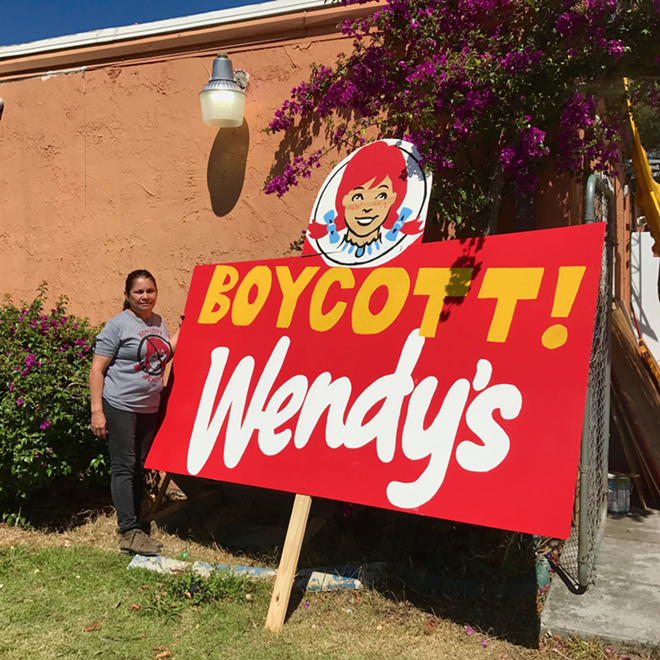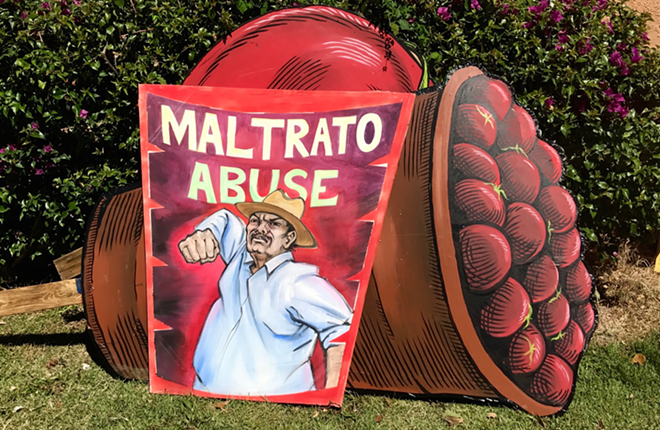The Coalition of Immokalee Workers and its allies are planning to parade down the one-mile stretch between Publix Greenwise and Wendy’s on Kennedy Blvd near Hyde Park on Wednesday, March 29.
Their aim?
To draw attention to the companies’ refusal to join a program designed to upend decades of farmworker exploitation. A vigil outside of Wendy’s will mark the final stopping point of the CIW’s 2017 Fair Food Campaign tour.
Through CIW's Fair Food Program, powerful corporate players in the tomato buying business—many of them highly recognizable brands—agree to uphold the CIW Fair Food Code of Conduct and pay a penny-per-pound premium that tomato growers pass on to workers. Walmart, Whole Foods and McDonalds are among companies that have signed onto the worker-led effort to make farms safer and healthier for laborers. In 2005, Taco Bell made history as the first company to sign the code after a years-long boycott led by CIW and socially mindful consumers. So many companies followed suit that CIW established the FFP to steer a larger scale effort to eliminate farm worker abuse. Wendy’s is the last of the fast food industry’s major buyers to join.
Approximately 120 miles south of Tampa, in a part of South Florida once described by a US Justice Department official as “ground zero for modern slavery,” some of the world’s largest tomato producers operate in the Immokalee area. At the southern end of the dusty town’s Main Street, the CIW headquarters is situated between streets lined with trailers and motel rooms converted into single-room apartments where migrant workers live during the harvest season.
Nely Rodriguez stands next to the CIW parking lot, where activists put the finishing touches on floats for the Return to Human Rights Tour parade that will roll through the streets of Columbus, OH, just a few miles shy of the Wendy’s headquarters on March 26. Wearing a grey shirt with the Wendy’s freckle-faced mascot crossed out, Rodriguez, a former farm laborer who now educates workers about their rights, talked to CL about the code’s advances of human rights.
Under the FFP, workers once wrought by fear are now free to speak up when their wellbeing is jeopardized.
“As part of the Fair Food Program, we have a 24/7 complaint hotline in which workers now feel comfortable and empowered to report any complaints or abuses they have experienced,” Rodriguez said.
The hotline is just one of several FFP communication mechanisms workers can now use to voice complaints, which Rodriguez said will be heard and consequences will be likely—unlike the past.
“Before, if a farmworker were to report abuse, there was no resource for them to report that abuse and no assurance that they would be able to keep their job if they spoke out,” she said. “For example, a farmworker woman that reported sexual harassment would very likely lose her job or face threats. But now people know that there are consequences under the Fair Food Program for the grower, the supervisor, even the fellow worker.”
A Code of Conduct signed by both growers and buyers promises workers a safe and healthy workplace and a fair wage. Participating growers and buyers agree to uphold a zero-tolerance policy for forced labor, violence and sexual assault. The FFP offers workplace-rights education, a means for communicating workplace complaints without fear of employer retaliation and, through the buyer-paid one-cent premium, an increase in wages.
Dr. Fritz Roka, Associate Professor of Agricultural Economics with the University of Florida, called the impact of the wage increase “tremendous.” Workers are typically paid for each 32-pound bucket of tomatoes they pick. Through the FFP, their wages can jump from 50 cents to 75 cents per bucket, a 50 percent pay increase. But it’s the code of conduct for workplace conditions that’s revolutionizing the agribusiness community, said Roka.
Written and administered with the help of CIW, the code maintains that buyers can only purchase tomatoes from participating growers. A significant breach or continued misconduct could lead to growers’ removal from the program, effectively costing them the business of powerful buyers.
To monitor compliance, CIW established the Fair Food Standards Council in 2011. Under the directorship of former New York Supreme Court Judge Laura Safer Espinosa, the council conducts financial and field audits, and issues corrective action plans in the event of a determined grower violation. Safer Espinoza calls the Fair Food Program “a win-win-win model for the 21st century” wherein growers and laborers collaborate to set and maintain high workplace standards.
The close relationship between CIW and FFSC makes some growers uncomfortable. Roka, whose work at the UF Southwest Research & Education Center in Immokalee has put him in close contact with area growers, said some “growers and employers are very skeptical about being treated fairly with an auditor that is that closely aligned with the advocacy group.”

But Safer Espinoza says that without input from the experienced workers at CIW, the FFP would cease to serve its function as a worker-driven responsibility program. While Fair Food Standards Council works closely with CIW to uphold the code, “nobody has a predetermined mindset when a [complaint] case comes in…there are no knee-jerk reactions.”
The most recently released annual FFP report indicates that between 2011-2015, FFSC determined that over 35% of complaint cases were not valid or not in violation of the code. Only one percent of cases resulted in a grower’s suspension.
Meanwhile, buyers like Wendy’s and Publix continue to avoid the responsibility associated with joining the Fair Food Program, in spite of advocates’ insistence that only through action from the the highest level of the supply chain will workplace conditions improve.
“We support the goals of any organization that seeks to improve human rights, but we don’t believe in the principle of paying another company’s employees,” said Wendy’s representative Heidi Schauer.
When the Florida Tomato Growers Exchange signed on to the Fair Food Program, effectively bringing 90% of the Florida tomato program with it, Wendy’s shifted the bulk of their tomato purchases from Florida to Mexico. Advocates criticize the move as an evasion of mechanisms that monitor forced labor or workplace abuse. This month Wendy’s released an updated Supplier Code of Conduct. Notably absent is any language about zero-tolerance for workplace violence and slavery.
Publix takes a different approach to avoidance. Instead of addressing human rights violations, the Florida-based retailer describes workers’ objections to dangerous and problematic workplace conditions on farms as “labor disputes.” Per their public statement on the CIW campaign, “We believe it is the responsibility of all our suppliers — including Florida farmers who grow tomatoes and other produce — to manage their own workforce, including paying wages and providing work conditions that comply with federal and state laws.”
Unfazed by opposition, CIW shows no signs of shortening the strides made in furthering workers’ rights, and that doesn’t stop at the tomato fields. Recently the Fair Food Program’s revolutionary model has gained traction among strawberry and bell pepper growers.
None of the gains made in the nearly two decades of CIW’s workers’ rights campaign would be possible without the pressure consumers have put on large corporations to demand corporate social responsibility. Rather than stomaching the knowledge that their tomatoes come at the cost of basic human rights, customers would prefer to take their business elsewhere. But Publix’s grip on the southern market makes it difficult for shoppers to find a new place to get groceries, and as long as there are tomato growers operating outside of the FFP, both Wendy’s and Publix can steer clear of “labor disputes” over worker abuse.
It took four years for CIW to win Taco Bell and its parent company Yum! Brands on the Fair Food Code of Conduct. On March 29, the CIW vigil outside of the Tampa Wendy’s will be the final stop on the tour, but it’s far from the last move for the CIW campaign for workers’ rights.



